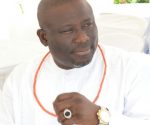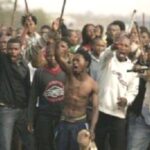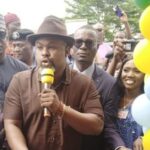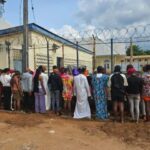One Year After, Abducted Delta Commissioner, Hope Eghagha Narates his Ordeals in the Hands of Kidnappers
LAGOS OCTOBER 4TH (URHOBOTODAY)-It is one year to the morning when I was violently abducted by hoodlums while travelling from Warri to Asaba, on the way to a state event. Precisely at Owa-Oyibu junction, the staccato sound from automatic weapons woke me up from a deep sleep, halting the journey, instilling fear, confusion and a virtual paralysis of the thinking process. When I looked in the direction of my orderly, who was perched on the front passenger seat and saw a deep gash on the side of his neck, I didn’t need a second look to know that there was no life in him. Thus began my 16-day nightmarish ordeal in the hands of kidnappers in the land of my birth that I had returned to serve with a passion.
Kidnap! Nothing in my life, personal or vicarious, prepared me for that violent encounter and its aftermath. My University of Lagos psychologist assured me that it would take a year for the trauma to wear off, all things being equal. Not comforting. One full year? In the immediate post-kidnap period, not even a trip to the serenity of Dubai could clear the etching, a kind of psychological thrombosis which settled over me in a numbing manner. A return to the scene was the only cure. Not that simple though. The return had stages; first the airports, then the Lagos traffic, with a latent fear whether another attack was imminent. Fear of sudden sounds. An almost paranoiac suspicion of everyone remotely connected to the experience. A two-week stay in Lagos helped to set the new routine. Then memories, usually a companion at night, took over!
Pulled out through the window because the door wouldn’t open, three armed men seized me and kept asking: ‘Bullet touch you?’ Of course I didn’t realise the import of the question until my return from captivity when I saw the car. Bullet ridden, it took the grace of God to survive the hail without even as much as a graze. Indeed, I asked myself: ‘Was I inside this car? In the assailant’s car where I was shoved into the back seat and ordered to lie down, one of the hoodlums sat on my head. A step on the brake and I would crumble to the floor, with my head still under the stinking buttocks of a kidnapper, almost breaking my neck. Not a good story to tell, brother, not a good story. In the course of the journey, Stinking Buttocks stole my wristwatch, motioning me to shut my mouth in forced conspiracy.
‘Where are your phones? ‘They are in the car’. ‘You idiot! Just a small assignment to seize the phones and you failed. “Do you have any money in the car? Yes. How much? ‘About one hundred and eighty thousand naira! ‘Let’s go back and get it’. ‘No, the leader said. ‘Do you know any phone number on which we can reach your people? ‘Yes’.
Some 40 minutes later the car came to a stop. A gate was opened and I was ordered to shut my eyes. We drove in. I came out, and from the corner of my ‘shut’ eyes, I saw it was a bungalow. Can’t remember the colour anyway or the location. The knowledge that my orderly had been slaughtered did not encourage any form of resistance or adventure.
Inside the ‘safe house’, I was pushed into a bed. Inner vest was ripped apart and used as a blindfold. For 16 days, I remained blindfolded, groping my way to the toilet. They left me in the room for about an hour. Interrogation to establish my identity then started. Obviously they were in touch with somebody at the other end of the phone who asked questions. ‘Yes, naim’, ended the conversation. In the evening, they wanted to know what I would like to eat. Of course I couldn’t bring myself to eat. Food wouldn’t pass through my throat. Death threats over 20 times a day accompanied with a description of the most macabre method of killing could not make eating possible. How did the thought of immersing a man in water for five days, with only the head above water-level so that death would be slow and painful, come to their minds? Or cutting off one’s head and leaving it on a stake on the highway? Or burying a man alive? How did these evil thoughts come to the mind of young men? Besides, who was sure of the quality of food? I had been on a personal health/spiritual fast for about two weeks before and so could stand hunger. I stayed without food for eight days, drinking only a sachet of water each day.
On the ninth day, I agreed to a bread meal. The smallest loaf available in the Nigerian market was offered. I ate it for three days. Took a bottle of malt, a coca cola, and a sprite and stayed off soft drinks for fear of the sugar disease. Death threats reigned. ‘Mistake dey happen o’ was also a common refrain.
Interrogations were humiliating and torturous. How much did I have in my bank accounts? Why don’t you have one hundred million naira in your account? Why don’t you give your wife contracts? Where are your children? Who is that man always making comments from San Francisco on FB? How much did government share every week? Between two State officials who had more money? How come I was travelling on a Sunday morning? Do you know we killed the policeman? Are you going to marry his wife if you leave here? What happened to the money which all the tertiary institutions gave to me weekly? Why did the State government decide to ban the use of motor cycles? Each answer that wasn’t satisfactory was followed by a slap or a knock with the butt of a gun. The ban on Okada! This was a sore point. At the time, the ban hadn’t taken effect and they wanted me to convince the government to withdraw the ban. In the heat of the moment, one could be compelled to agree with the kidnappers. This may account for Human Rights lawyer Ozekhome’s call for amnesty for all kidnappers shortly after his release. Personal forgiveness is necessary for a release of the soul from bitterness. But the State?
Strange that one of my captors said he was moved to tears on reading a poem posted by a fellow-poet, Ines Rivera. Strange that they were surprised students in our tertiary institutions were going to demonstrate against my abduction. Strange that they knew about the State’s scholarship scheme and wanted to know if I could get funds released to them from government accounts. Strange that they said ‘you have a good heart, but you have bad people around you’! Deep. Strange that they said ‘we know you; we know the work you are doing in the State. So why was I a victim?
It is one year After The Kidnap (ATK 1), my new birth calendar. The scars are still there, deep. Not healed, sore. But I believe they will heal, with effort and time. Odia Ofeimun says I shouldn’t ask why it happened to me; just how it happened. Tough! Certain smells still bring memories of those 16 horrible days. Certain ring tones, certain words, certain pictures and news reports, the cooing of a bird. I still remember the gash on my orderly’s neck; conscious that he lost his life. His two kids will grow up without their biological father. As we speak more souls are under torture of kidnappers. There are good people in the land too. How may we allow bad people to determine the soul of a nation? As a parting shot, they asked if I would write about the experience. Yes of course, I answered. Make sure you do a thanksgiving, they added. Of course I did, and will give thanks for the rest of my life. And also thank everyone who stood by me and my dutiful and loving wife and family while darkness held sway for sixteen days.
– This Best Outside Opinion was written by Prof. Hope Eghagha, the commissioner for higher education in Delta state
Source: The Scoop





















